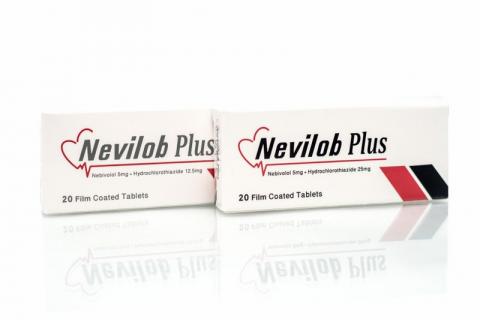Brand Name: Nevilob Plus 5/ 25 mg Film Coated Tablet
Nevilob Plus 5/ 12.5 mg Film Coated Tablet
Active Ingredients: Nebivolol Hydrochloride / Hydrochlorothiazide
When is Nevilob Plus Tablet prescribed for?
Nevilob Plus is indicated as a replacement therapy for patients with essential hypertension who have already received nebivolol & hydrochlorothiazide as separate tablets in the same dosage
How should you take Nevilob Plus Tablet?
Usual Dose:
The dose is one tablet of Nevilob Plus 5 mg / 12.5 mg or 5mg / 25 mg daily corresponding to the previously taken dose of separate tablets, it’s preferably to be taken at the same time of the day.
Tablets may be taken with meals.
Special Doses:
- Patients with Renal sufficiency
The dose of Nevilob Plus should be carefully adjusted in patients with mild to moderate renal impairment (Creatinine Clearance > 30 ml/ min). The previously prescribed dose of Nebivolol & Hydrochlorothiazide separately should not be exceeded. For severe renal impairment (Creatinine clearance < 30 ml / min) see contraindications.
- Elderly (Geriatrics)
The dose of Nevilob Plus should be carefully adjusted in elderly patients. The previously prescribed dose of Nebivolol & Hydrochlorothiazide separately should not be exceeded.
- Pediatrics
No studies have been conducted in children & adolescents. Therefore, use in children & adolescents is not recommended.
When you should not take Nevilob Plus Tablet?
- Hypersensitivity to the active substances (nebivolol/ hydrochlorothiazide) or to any of the excipients or sulphonamide.
- Severe Hepatic insufficiency or Severe renal insufficiency (CrCl < 30 ml / min)
- Acute heart failure, cardiogenic shock or episodes of heart failure decompensation
- Sick sinus syndrome, including sino- atrial block.
- Second and third degree atrioventricular block (without a pacemaker)
- Severe Bradycardia (heart rate < 60 beat / min prior to initiation of therapy.
- Severe hypotension (SBP < 90 mmHg).
- Severe peripheral circulatory disturbances.
- Anuria.
- Bronchial Asthma.
- Metabolic Acidosis
- Hypokalemia resistant to treatment.
- Symptomatic Gout.
- Pregnancy & Lactation.
Possible Drug interaction with Nevilob Plus Tablet:
The following interactions apply to beta-adrenergic antagonists in general.
- Sedatives e.g. Barbiturates, Phenothiazine, and thioridazine.
- Non-steroidal anti-inflammatory drugs (NSAID): no effect on the blood pressure lowering effect of nebivolol.
- Medicines for Psychosis & depression e.g. tricyclics, barbiturates and phenothiazines; concomitant use may enhance the hypotensive effect of the beta-blockers (additive effect).
- Medicines used for anesthesia
- Medicines for asthma or certain eye disorders such as glaucoma or dilation of the pupil.
- Medicines for treating excessive stomach acid or ulcers ( antacid drugs )
- Combinations to be used with caution: Medicines for controlling the blood pressure or for heart problems (such as amiodarone, amilodipine, clonidine, digoxin, diltiazem, felodipine, nifedipine, quinidine, verapamil, nicardipine, methyldopa, lidocaine)
- Nevilob Plus should be taken during a meal and the antacid drug between meals.
Hydrochlorothiazide:
Lithium, Medicinal products affecting potassium level, Class III Antiarrhythmics, Some Antipsychotics, Digitalis Glycosides, Medicinal products used in Gout (Probenecid & Allopurinol)
Special Warning and Precaution when using Nevilob Plus Tablet:
The product contains lactose. Patients with galactose intolerance, the lapp lactose deficiency or glucose – galactose malabsorption shouldn’t take Nevilob plus
Nebivolol
Nevilob Plus does not affect glucose levels in diabetic patients. Care should be taken in diabetic patients however, as nebivolol may mask certain symptoms of hypoglycaemia (tachycardia, palpitations).
The following warnings and precautions apply to beta-adrenergic antagonists in general:
1- Elderly patient over 65 years of age start the treatment for hypertension with 5mg once daily.
2- Patient with kidney problems start the treatment with 5mg once daily.
3- In certain situations, Nevilob Plus should be used with greater caution. These situations are: Abnormally slow heartbeat, Poor circulation in the arms or legs, prolonged breathing problems, increased production of thyroid hormone, Psoriasis, Allergy. Nevilob Plus may intensify the reaction to pollen or other substances are allergic to.
Hydrochlorothiazide
In Renal Impairment; Thiazides may cause Azotemia. If progressive renal impairment becomes evident, as indicated by a rising non- protein nitrogen, careful reappraisal of therapy is necessary. Metabolic & Endocrine effects; Dosage adjustments of insulin or oral hypoglycemic agents may be required.
Electrolyte imbalance: As for any patient receiving diuretic therapy, periodic determination of serum electrolytes should be performed at appropriate intervals
Nebivolol / Hydrochlorothiazide combination
In addition to the warnings related to the mono-components, the following specially applies to Nevilob Plus:
Galactose intolerance, Lapp lactose deficiency, glucose- galactose malabsorption: this medicinal product contains lactose. Patients with rare hereditary problems of galactose intolerance Lapp lactose deficiency, glucose- galactose malabsorption shouldn’t take this medicinal product.
Special information if you are pregnant or breastfeeding:
Use in Pregnancy
Nevilob Plus is contraindicated in Pregnancy.
Hydrochlorothiazide decrease the plasma volume & placental hypoperfusion
Use in Lactation
Animal studies have shown that nebivolol is excreted into breast milk.
Nevilob Plus is contraindicated in lactation
Possible Side Effects of Nevilob Plus Tablet:
The adverse reactions reported, which are in most of the cases of mild to moderate intensity:
Headache – Fatigue - Dizziness - Paraesthesias -Tiredness - Skin rashes-Shortness of breath – Diarrhea – constipation – nausea - Nightmares or swelling hands or feet.

